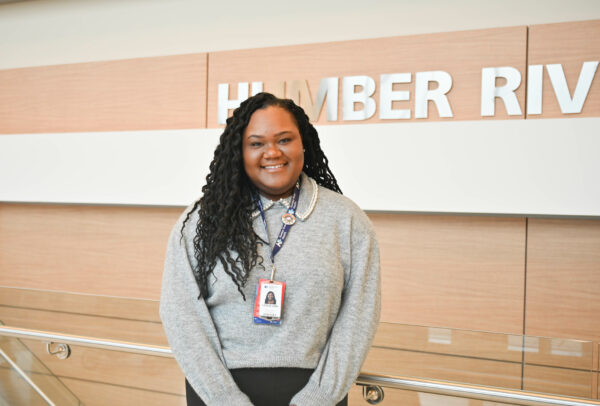Black History Month with Leslie-Ann Bailey
23
Feb
2024
Leslie-Ann Bailey is a Social Worker in the Apotex Emergency Department at Humber River Health (Humber) and has been with the organization for almost five years. This Black History Month, Leslie-Ann shared her thoughts on what it means to celebrate Black history and culture, and the importance of diversity in our healthcare settings.

How do you celebrate Black History Month (BHM)? Why is it important to you?
One’s relationship and celebration of Black History Month is a very individualistic experience. For myself, I prioritize supporting Black-owned businesses, listening to music and reading literature by Black creatives, and by making a conscious effort to learn more about Black history, as our contributions to society and, more specifically, medicine have been historically underscored. There is power in storytelling, so it is imperative to amplify the voices of people of colour every day. BHM is a great reminder for us to be mindful, reflective, and celebratory of the Black community and our collective experiences.
How do you think diversity in healthcare leadership impacts patient care and hospital culture?
It is so important for there to be diversity in every level of healthcare, from front-line to leadership. Through more diversity, the more cultural sensitivity and awareness there is of the barriers and challenges faced by the Black community to accessing care.
Given we are located and serve a diverse community, it is imperative that leadership is also reflective of this. Having a range of diversity sitting at the table allows for cross-cultural patient-centered care. When staff and patients see people in leadership that look like them, it demonstrates that inclusivity is important to Humber and enables innovation, creativity, and fosters feelings of safety.
How do you demonstrate leadership in your day-to-day work?
As a Caribbean person, I feel we cannot amplify the voices of the Black community if we do not participate in discussions that directly impact patient care. Although my workload can be quite unpredictable, I do participate in working groups to ensure my voice and experiences of working with patients of all cultural backgrounds is heard.
What advice would you give to young Black professionals aspiring to pursue a career in healthcare?
It is important for all practitioners, regardless of ethnicity, to be consistently self-reflecting, becoming aware of their unconscious biases and actively work on ensuring patients receive equitable care and feel heard.
The reality is, there has historically been a lot of harm perpetuated by the medical community towards the Black community. It is important for clinicians to know our history, because the better you understand, the better care you can provide in the future. I would advise young professionals that want to work in healthcare to let their lived experiences motivate them to provide the care they would want everyone to receive regardless of race, ethnicity, or creed.
